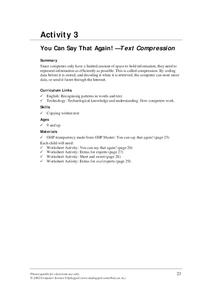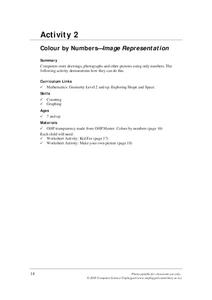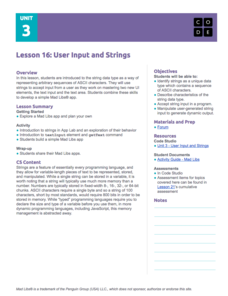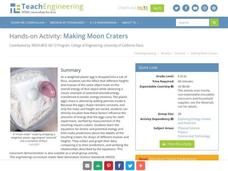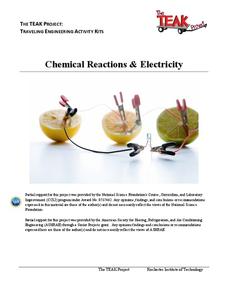Teach Engineering
Storing Android Accelerometer Data: App Design
There's an app for that! Pupils learn to build an app that will store data on an Android. The instructional activity introduces class members to the tiny database, TinyDB, for Android devices. A video tutorial provides an...
Exploratorium
Indicating Electrolysis
Sure, your learners know water is made up of two molecules, but watching them separate helps the class see the construction like never before. This resource provides directions on how to build a simple electrolysis device using a...
Curated OER
Businesses That Provide The Needs of Our Community
Students investigate the economy by creating a mock store in the classroom. In this business instructional activity, students research traditional department stores and brainstorm with their classmates as to what they could sell in...
Curated OER
Wiki Comment: The News and You
Kids explore the world of news media by creating a wiki page. They will create a wiki page on the Internet in order to comment on and question the stories that take place in the world. They will practice creative writing by summarizing...
Teach Engineering
Design Step 5: Construct a Prototype
Enough with the talking, let's build something! In the fifth step in the engineering design process, young engineers build a prototype to test their ideas. The activity walks them through the process of evaluating it step-by-step....
Computer Science Unplugged
You Can Say That Again! – Text Compression
Compression, the process computers use to store information, is the focus of a resource that presents two different stories that describe the concept of compression by eliminating repeated letters and replacing them with a...
Code.org
Introduction to Arrays
How can you store lists in a computer program? The 16th installment of a 21-part unit introduces arrays as a way to store lists within a variable. Individuals program a list of their favorite things—adding interest to the activity.
Computer Science Unplugged
Colour by Numbers–Image Representation
How do computers store and send images? Here's an activity that explains one way a computer can compress image information. Pupils decode run-length coding to produce a black and white image. Pairs then work together to code and...
Biology Corner
Technology and Inventions Project
Technology—what exactly is it? Find out with a project designed to inspire the inner inventor in us all. The activity begins with a captivating podcast and a search of multiple websites that display different inventions and technology,...
Code.org
Controlling Memory with Variables
Not all variables are created equal. Discover how variables in computer science are different from variables in math class. Scholars learn to work with variables in computer programming by developing a mental model for how variables...
Code.org
User Input and Strings
Pupils learn to apply strings in computer science. They master two new user interface elements and also use string type data to represent ASCII characters. Finally, individuals create an app for Mad Libs in the eighth activity of the...
Code.org
Encoding B and W Images
Imagine drawing with zeros and ones. The third lesson in a unit of 15 introduces the class to creating black and white images. Pairs get together to create an encoding scheme in order to make these images. They move on to a...
Discovery Education
Stomp Rockets
Watch the excitement grow as learners experiment with homemade rockets. Pupils create their own rockets from a soda bottle and experiment with launch angles. They discover the launch angle has a significant effect on the distance the...
Code.org
Canvas and Arrays in Apps
Scholars learn how to make a digital canvas and fill it with artwork by creating a drawing app using the canvas element. The activity requires learners to previous knowledge of arrays and return commands to draw images.
Teach Engineering
Making Moon Craters
Create an egg-citing study of energy. Pupils investigate the effect of height and mass on the overall amount of energy of a falling object. The fourth segment in a six-part series on energy uses a weighted egg falling from different...
Curated OER
Creating an Autobiography
Students create technology based portfolios for others to use as a pattern for assessment. They make a "Personal Autobiography Page" to start the portfolio.
Curated OER
Making Big Cats' Web Pages
Students investigate the lives of big cats by creating a website. In this web design lesson, students examine web authoring software in pairs as they read books on big cats. Students share their web page creations with the...
Rochester Institute of Technology
Chemical Reactions and Electricity
After a discussion of chemical reactions and electricity, scholars break into groups and follow a scripted activity to discover if fruit can power a clock. After a concluding discussion, the class a presented with a challenge.
Discovery Education
The Time of Our Life
Mammals are some of the newest organisms to appear on Earth. Young scholars complete an activity that results in a timeline showing the appearance of different types of living organisms. Provided with a list that spans from prokaryotes...
Polytechnic Institute of NYU
Potential vs. Kinetic Energy
Legos in science class? Watch your pupils fall in love with this activity. After learning to measure potential and kinetic energy, young scientists create their own ramps using Lego Mindstorm sensors and software.
Code.org
Bytes and File Sizes
A bite of bits. The first instructional activity in a unit of 15 introduces the class to the byte. Pupils learn about other standard units for measuring file sizes, develop an understanding of relative sizes and the kind of units...
Discovery Education
Market Research and Design: The Headphone Challenge
Watch augmented reality bring classrooms to life. Scholars work in groups to design, build, and market a new pair of headphones meant for children under three. They use an augmented reality app to show their headphones in action as they...
Teach Engineering
Maximum Mentos Fountain
A messy fountain is potentially an energy experiment in disguise. Groups investigate the variables in creating a fountain from soda and Mentos. The last activity in a six-part series on energy has the class observe the fountain in terms...
Discovery Education
Through the Looking Glass
Turning white light into colors only takes a little scientific know how! Young scholars create their own spectroscope in a hands-on activity exploring the properties of light. Using a diffraction grating, they discover how white light...





